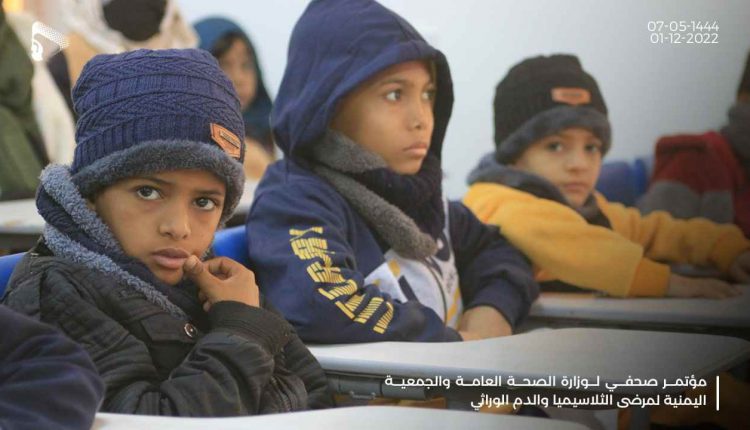In light of the continuation of the unjust aggression and blockade on Yemen, and in conjunction with the international silence that exceeded the ceiling of complicity to direct engagement with the coalition of aggression, the Ministry of Health reiterates the call to save the lives of hundreds of thousands of besieged patients in Yemen.
In a conference held in the capital, Sana’a, the Ministry of Public Health and Population confirmed that the lives of 1,500 people with thalassemia and 40,000 people with sickle cell anemia are at risk due to the lack of medicines as a result of continued aggression and blockade.
In the conference held in cooperation with the Yemeni Society for Thalassemia and Hereditary Blood Patients to highlight the effects of aggression and blockade on patients with thalassemia and Inherited hemolytic anemia, the Ministry called on international and humanitarian organizations operating in Yemen to carry out their responsibilities to continue supporting the health sector and focus on supporting patients with thalassemia and inherited hemolytic anemia.
The statement of the conference, which was read by the ambassador of child thalassemia patients, Anas Nasser, the ministry held the countries of aggression responsible for the deterioration of the health situation, the high number of deaths, the lack of medicine for patients with thalassemia and hemolytic anemia. The statement called on the United Nations and its organizations and bodies to pressure the countries of aggression to lift the siege and open Sana’a airport and the port of Hodeidah, so that the lives of patients with thalassemia and hereditary blood diseases; in addition, to ensure the continued provision of basic, supportive and assistive medicines for patients, especially iron-depleting drugs and hydroxyurea medicine.
The statement called on international organizations to support efforts to enhance safe blood transfusion services for patients because the costs of medicines are high for the patients’ families. Moreover, it called for supporting the efforts to prevent and combat thalassemia and hereditary blood diseases by providing electrophoresis devices and solutions for conducting early medical examinations “premarital examination.”
The Ministry also called on the relevant authorities to quickly issue a binding law to conduct premarital examinations to protect children and future generations from thalassemia and genetic blood diseases.
For his part, the head of the Yemeni Thalassemia Society, Dr. Ahmed Shamsan, reviewed the situation of thalassemia patients and blood clots, their needs for medicines and blood, and the difficulties facing the association as a result of the increasing number of cases infected with this disease.
He pointed out that 463 deaths were recorded as a result of the lack of medicines until last October, and 700 new cases of infection were documented last year, stressing the need to take a decision to limit its spread, and to conduct a premarital examination.
It is noteworthy that thalassemia diseases and hereditary hemolysis are among the diseases that spread silently in societies, despite their dangers. They are chronic hereditary diseases that are transmitted from parents who carry the genetic trait to their children through genes. It is characterized by deficiency of red blood cells from several months after birth until the person passes away. Anemia requires the need for blood transfusion, to prevent any complications for the patient. Anemia can also cause the enlargement of the spleen and liver, fragility and deformities in the bones and face with the emergence of the front teeth, as well as changes in hormones and often poor growth, and a continuous high iron level as a result of frequent blood transfusions and the continuous decomposition of short-lived cells. It also can affect the various body systems, which may eventually lead to damaging organs, or failure and disability in the functions of the body systems, especially the heart, spleen, liver, kidneys, and pancreas.







